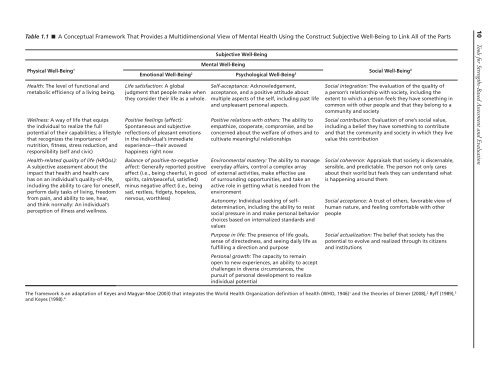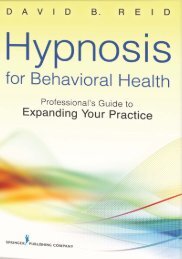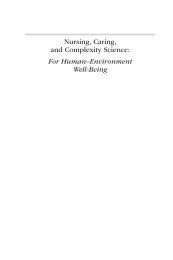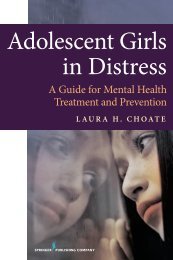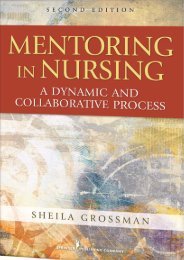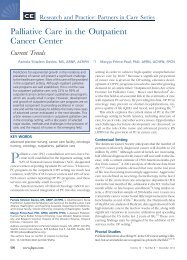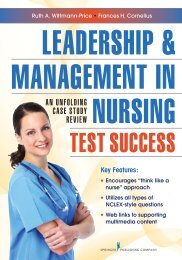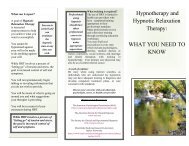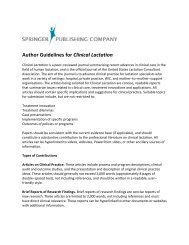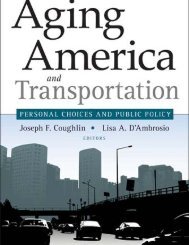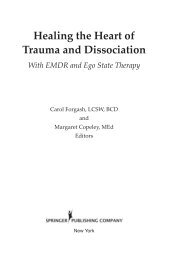Tools for Strengths-Based Assessment and Evaluation - Springer ...
Tools for Strengths-Based Assessment and Evaluation - Springer ...
Tools for Strengths-Based Assessment and Evaluation - Springer ...
Create successful ePaper yourself
Turn your PDF publications into a flip-book with our unique Google optimized e-Paper software.
Table 1.1 ■ A Conceptual Framework That Provides a Multidimensional View of Mental Health Using the Construct Subjective Well-Being to Link All of the Parts<br />
Subjective Well-Being<br />
Mental Well-Being<br />
Physical Well-Being 1 Social Well-Being 4<br />
Emotional Well-Being 2 Psychological Well-Being 3<br />
Health: The level of functional <strong>and</strong> Life satisfaction: A global Self-acceptance: Acknowledgement, Social integration: The evaluation of the quality of<br />
metabolic effi ciency of a living being. judgment that people make when acceptance, <strong>and</strong> a positive attitude about a person’s relationship with society, including the<br />
they consider their life as a whole. multiple aspects of the self, including past life extent to which a person feels they have something in<br />
<strong>and</strong> unpleasant personal aspects.<br />
common with other people <strong>and</strong> that they belong to a<br />
community <strong>and</strong> society<br />
Wellness: A way of life that equips Positive feelings (affect): Positive relations with others: The ability to Social contribution: <strong>Evaluation</strong> of one’s social value,<br />
the individual to realize the full Spontaneous <strong>and</strong> subjective empathize, cooperate, compromise, <strong>and</strong> be including a belief they have something to contribute<br />
potential of their capabilities; a lifestyle refl ections of pleasant emotions concerned about the welfare of others <strong>and</strong> to <strong>and</strong> that the community <strong>and</strong> society in which they live<br />
that recognizes the importance of in the individual’s immediate cultivate meaningful relationships value this contribution<br />
nutrition, fi tness, stress reduction, <strong>and</strong> experience—their avowed<br />
responsibility (self <strong>and</strong> civic)<br />
happiness right now<br />
Health-related quality of life (HRQoL): Balance of positive-to-negative Environmental mastery: The ability to manage Social coherence: Appraisals that society is discernable,<br />
A subjective assessment about the affect: Generally reported positive everyday affairs, control a complex array sensible, <strong>and</strong> predictable. The person not only cares<br />
impact that health <strong>and</strong> health care affect (i.e., being cheerful, in good of external activities, make effective use about their world but feels they can underst<strong>and</strong> what<br />
has on an individual’s quality-of–life, spirits, calm/peaceful, satisfied) of surrounding opportunities, <strong>and</strong> take an is happening around them<br />
including the ability to care <strong>for</strong> oneself, minus negative affect (i.e., being active role in getting what is needed from the<br />
per<strong>for</strong>m daily tasks of living, freedom sad, restless, fidgety, hopeless, environment<br />
from pain, <strong>and</strong> ability to see, hear, nervous, worthless)<br />
Autonomy: Individual seeking of self-<br />
Social acceptance: A trust of others, favorable view of<br />
<strong>and</strong> think normally: An individual’s<br />
determination, including the ability to resist human nature, <strong>and</strong> feeling com<strong>for</strong>table with other<br />
perception of illness <strong>and</strong> wellness.<br />
social pressure in <strong>and</strong> make personal behavior people<br />
choices based on internalized st<strong>and</strong>ards <strong>and</strong><br />
values<br />
Purpose in life: The presence of life goals, Social actualization: The belief that society has the<br />
sense of directedness, <strong>and</strong> seeing daily life as potential to evolve <strong>and</strong> realized through its citizens<br />
fulfi lling a direction <strong>and</strong> purpose<br />
<strong>and</strong> institutions<br />
Personal growth: The capacity to remain<br />
open to new experiences, an ability to accept<br />
challenges in diverse circumstances, the<br />
pursuit of personal development to realize<br />
individual potential<br />
10 <strong>Tools</strong> <strong>for</strong> <strong>Strengths</strong>-<strong>Based</strong> <strong>Assessment</strong> <strong>and</strong> <strong>Evaluation</strong><br />
The framework is an adaptation of Keyes <strong>and</strong> Magyar-Moe (2003) that integrates the World Health Organization defi nition of health (WHO, 1946) 1 <strong>and</strong> the theories of Diener (2008), 2 Ryff (1989), 3<br />
<strong>and</strong> Keyes (1998). 4


